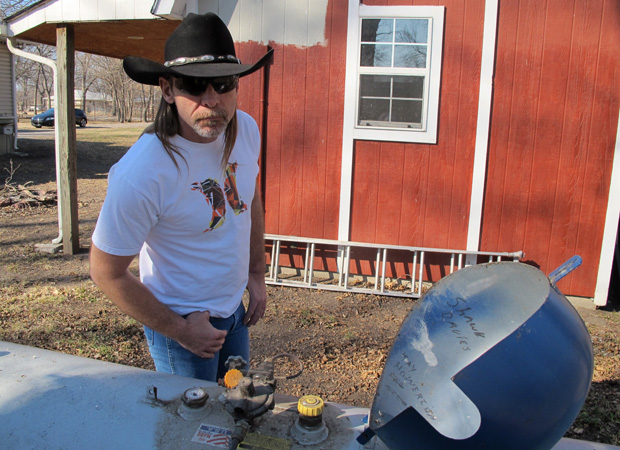
DaviesPic
Logan Layden / StateImpact Oklahoma


DaviesPic
Logan Layden / StateImpact Oklahoma

Logan Layden / StateImpact Oklahoma
Propane customer Shawn Davies vowed not to refill his tank until priced drop significantly.
The 400,000 or so Oklahomans who rely on propane to heat their homes know the routine: When the weather is warm, propane is cheap. When it gets cold, and demand goes up, so does the price.
But what happened this winter is unprecedented. Propane prices are starting to ease after blowing past all-time records in January, reaching a national average of more than $4 a gallon.
There are many reasons the price of propane jumped so high so fast, but it all starts in Japan three years ago, when an earthquake triggered the tsunami that caused the disaster at the Fukushima Nuclear Power Plant.
When disaster struck Japan, it turned to, in part, to propane to meet its energy needs, says Kelly Van Hull, an energy market analyst for Houston-based RBN Energy.
“Obviously, when the earthquake and the tsunami happened in Japan, it changed a lot of their energy situation,” she says. “They shut down a lot of their [nuclear power plants]. They started importing a lot more propane and butane.”
Around the same time, production of oil and natural gas — of which propane is a byproduct — was gushing out of places like the Bakken Formation in North Dakota. The central United States was awash in propane, and the price bottomed out.
“Production came on very strong. There was not incremental domestic demand to soak up that propane, so prices fell down to 70 cents,” Van Hull says. “That created up to a dollar arbitrage opportunities between propane in the United States and propane in Japan.”
The industry responded quickly.
In 2013, the pipelines that once carried propane north from refineries in Texas and Louisiana were reversed. The industry wanted to transport more product to the Gulf Coast, where it could be exported, because analysts saw little reason to continue pumping propane to places already awash in it.
Then it started raining. The fall corn crop was very wet, and the giant heaters that dry it mostly run on — you guessed it — propane, as Van Hull’s colleague, Callie Mitchell, reported in a prophetic post on RBN’s quirky but informative website in November 2013, called “Farmer Dries Corn, and I Do Care:”
The upper Midwest is enjoying the largest bumper crop of corn in the record books, and due to recent weather it is “wet” corn needing more drying, thus more propane. With the U.S. “bumper crop” of propane from processing shale gas flooding the market, you might wonder why there is a problem. Clearly the answer is logistics – having the barrels at the right place at the right time. And that’s the reason for more concern when we get to next year.
Then a string of winter storms reduced production, while also making it more difficult for delivery trucks to navigate icy roads. All this as demand went through the roof.
“Nobody saw the combination of the crop drying and the cold weather back to back happening,” RBN’s Van Hull says.
It all added up to some pretty chilly nights at Shawn Davies’ house. Davies works in a Tulsa office building, but lives in a modest little house in the country a few miles south.
“Ah, it wasn’t too bad,” Davies says. “A couple of extra blankets and some pups on the bed, you stay a little toasty that way.
What most of the homes in Davies’ area have in common is a large propane in the yard.
“It’s pretty low right now. We’re on 29 percent,” Davies says as he checks the gauge on his tank. “We refuse to refill it until the price of gas comes down.”
For Davies, refusing to buy more propane until the price drops is a matter of principle — he says he has the funds to do it, but won’t. For others, however, there’s little choice. Oklahoma Gov. Mary Fallin’s spokesman, Alex Weintz.
“We know that there were actually thousands of Oklahomans who — for at least a period of time — chose not to heat their homes, which, when it’s 10 degrees out, that can actually be dangerous,” Weintz says.
So Fallin made sure propane users were at the front of the line when extra home heating assistance money became available though a federal program. And while accepting money from Washington can be controversial in Oklahoma, this time Fallin didn’t hesitate.
“That’s what that program is for,” Weintz says. “That’s very different than doing something like completely reorganizing a seventh of our economy, or whatever it is, when it comes to the healthcare industry and Obamacare.”
Van Hull says this winter was a 20 to 50 year anomaly, and she doesn’t expect to such such a large price spike again anytime soon. We’ll have to wait until next winter to be sure.